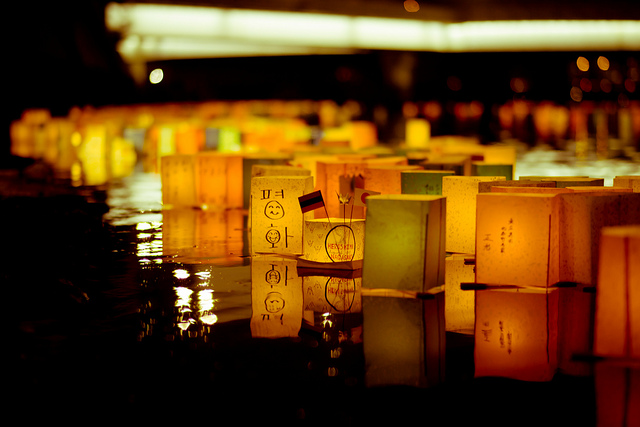70 years on, peace remains incomplete
Posted By Tessa Morris-Suzuki on August 10, 2015 @ 14:00
 [1]
[1]Japan has appeared to surrender, and we are waiting this weekend to hear whether this will become effective. If so, this horrible war will be at an end, but many of its ill-effects will be with us for a long time. It is, in fact, a new world that lies before us. I hope that freedom, beauty, quiet and security may find a place in it. It is a hope without much confidence.
Those words are part of a diary entry written by an Englishman on 12 August 1945, as the world waited for news of the end of the Asia-Pacific War. The author was neither well-known nor politically significant. I can quote his reaction to the end of the war only because he was my father and I have a copy of his 1945 diary.
But his words are worth recording because they remind us that, despite the images of flag-waving crowds and triumphalism that so often accompany reports of the allied response to Japan’s surrender, this was a moment of deep anxiety for many people. If Japan’s citizens responded with disbelief, exhaustion and despair to news of their country’s defeat, Americans, British, Australians and others responded to victory with feelings of relief that were often tinged with fear and sadness, particularly because victory was darkened by the shadow of the atomic bomb.
Earlier in his entry for 12 August, my father wrote:
On 7th August there was announced to an unsuspecting world the news that an atomic bomb had been dropped on Japan … It soon appeared that its power was not overstated, and that the town of Hiroshima, with over 200,000 inhabitants, was destroyed. This appalling weapon, and the new power that can be released for peaceful purposes, clearly alter the course of human development. It says something for present day humanity that there has been a profound sense of despondency since … Another war is too awful to contemplate.
By August 1945, many people were already beginning to fear that the new world ushered in by the allied victory and the atomic bomb would be a world of very incomplete peace; and so it proved to be. A global conflict between the two new great powers, the United States and the Soviet Union, was prevented, in part by the ‘balance of terror’. But the Cold War world became the site of many smaller ‘hot wars’ that inflicted terrible suffering on the people of the Koreas, Vietnam and other countries.
The new security obsessions of the Cold War order diverted and forestalled the process of peace making. Because of Cold War tensions, the 1951 San Francisco Treaty, which supposedly sealed the peace between Japan and its former enemies, was not signed by the Soviet Union, the People’s Republic of China, the Republic of China (Taiwan), nor by North or South Korea.
In the processes of redrafting, the terms of the treaty were revised in ways that left key territorial claims undefined. This served the strategic interests of the moment, but left unresolved a host of problems that plague international relations to this day. In the context of US Cold War strategy, Japan was encouraged to enter into reparations agreements with its Asian neighbours. This promoted a particular model of economic development, but failed to address individual claims by victims of war. Meanwhile, the nuclear arsenals of the Cold War powers expanded to grotesque proportions.
A second opportunity to address the unfinished business of peace making came in the early 1990s, with the collapse of the Soviet Union and the end of the Cold War in Europe. The new, fluid global order offered opportunities to both drastically reduce the stock of nuclear weapons, and to resolve territorial problems and questions of war responsibility.
During the 1990s, there were promising moves in this direction. The Japanese government issued the 1993 Kono Statement [2], which apologised for the Japanese military’s wartime abuse of ‘comfort women’, and the 1995 Murayama Statement [3], which expressed Japan’s heartfelt apology for its wartime actions. And new visions of East Asian regional cooperation were seriously debated.
But today, rather than building on those cautious positive steps, the countries of the region appear to be retreating behind the barricades of an emerging ‘Second Cold War’. Fear of China and Russia is leading to spiralling military expansion [4], and diverting attention from the still-urgent task of nuclear disarmament. A formal peace treaty between Japan and Russia has never been signed, and the territorial issues left in limbo by the San Francisco Treaty are becoming ever more intractable. Meanwhile, the Japanese government and sections of the media [5] have been cultivating a dangerous climate of historical denial [6] about war history within Japanese society.
The 70th anniversary of the end of the Asia Pacific War should be a time for reflection on the legacies of an incomplete peace process, and for renewed efforts to bring that process to completion. The task is a huge and challenging one; but now as then, the alternative to lasting peace is indeed ‘too awful to contemplate’.
This piece was originally published [7] on East Asia Forum.
Article printed from The Strategist: https://www.aspistrategist.org.au
URL to article: https://www.aspistrategist.org.au/70-years-on-peace-remains-incomplete/
URLs in this post:
[1] Image: http://www.aspistrategist.org.au/wp-content/uploads/2015/08/7725687560_4004177829_z.jpg
[2] Kono Statement: http://www.mofa.go.jp/policy/women/fund/state9308.html
[3] Murayama Statement: http://www.mofa.go.jp/announce/press/pm/murayama/9508.html
[4] military expansion: http://www.eastasiaforum.org/2015/05/09/south-korean-security-caught-in-the-us-china-crossfire/
[5] sections of the media: http://www.eastasiaforum.org/2014/02/06/free-and-fair-nhk-and-the-tokyo-election/
[6] historical denial: http://www.eastasiaforum.org/2014/07/16/japan-and-the-art-of-un-apologising/
[7] originally published: http://www.eastasiaforum.org/2015/08/07/70-years-on-peace-remains-incomplete-2/
Click here to print.